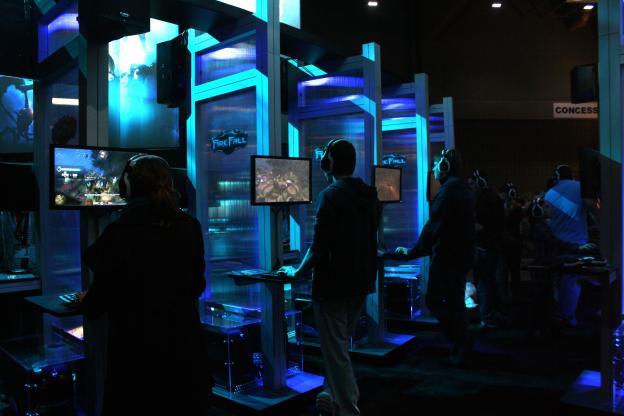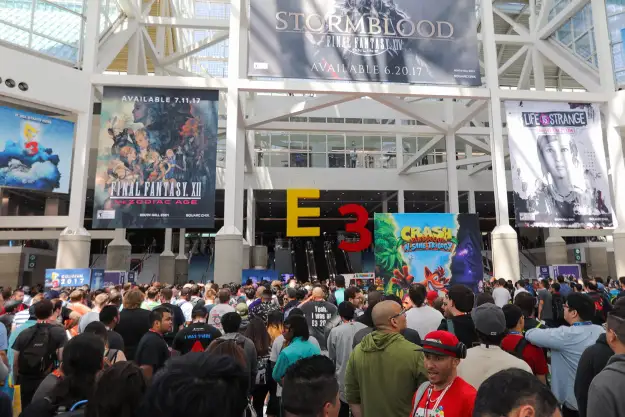 The past few years have served as a reality check for the gaming industry. A period of amazing growth in the middle of the last decade left many wondering if video games were entertainment’s next cash cow. Analysts and publishers were even throwing out the term “recession proof” in 2007 and 2008, backing up the argument with the theory that entertainment spending goes up during a recession because people are in greater need of escapism. History has proved that argument wrong.
The past few years have served as a reality check for the gaming industry. A period of amazing growth in the middle of the last decade left many wondering if video games were entertainment’s next cash cow. Analysts and publishers were even throwing out the term “recession proof” in 2007 and 2008, backing up the argument with the theory that entertainment spending goes up during a recession because people are in greater need of escapism. History has proved that argument wrong.
The last few years have seen a constant slide in retail sales. Digital distribution has made up much of that ground, but the overall picture is one of stagnation. U.S. game sales were down 9% overall in the third quarter of 2012 compared to the same point last year – and that does include digital purchases. The boundless optimism of 2007 has turned towards caution in 2012.
But why? The recession was a factor, but it’s technically over in some countries – including the United States. Some blame must fall on developers and publishers. So what can they do to improve and rejuvenate the industry? Here are a few ideas.
Gaming needs to broaden its base
The game industry has traditionally catered to a particular demographic that tends to buy high-budget, high-profit tiles more than anyone else. This is the “core gamer.” The stereotypical core gamer is a white male with disposable income who is somewhere between 16 and 35 years old. The majority of big-budget titles, and even many indie games, are designed with this demographic in mind.

Similar stories can be found in software. Call Of Duty: Modern Warfare 3 was the best selling game in the world for 2011, but did you know that the latest Pokemon was in third, Just Dance 3 was in 5th, and Mario Kart Wii was in 6th? It’s clear that there’s demand for games outside the core demographic.
Analysts have argued that, while this is true, gamers outside the core don’t buy games frequently enough to make an impact. But what games might they buy? The Wii, which became popular thanks to non-core gamers, is notorious for becoming a cess-pool of terrible third-party games and sub-par ports. There’s not much worth buying beyond a handful of immensely popular titles.
That seems strange. These games can obviously generate a lot of money – yet the attention remains on games that are designed with core gamers in mind. It’s not hard to understand why this is the case after paying attention to the gaming press for even a short period of time. The industry is dominated by white male developers and businessmen who are, for the most part, interested in games that will impress other white males. Working on the next Halo earns far more respect than working on the The Sims.

This also shows a continued, and even stubborn lack of recognition of what a “core gamer” really is. A recent ESA study shows that the male demographic is barely even the majority, with 47-percent of gamers being female. Woman over the age of 18 are also one of the fastest growing demographics, and yet the stereotype remains. Just look at games like Dead or Alive 5, the newest iteration of a sixteen year old franchise that revels in what many have classified as misogynistic representations of women. That series may be an extreme example, but there is a sad lack of empowered women, both in games and in the industry. That needs to change.
This narrow focus isn’t healthy. White males are a large demographic and one with money to spend, yet but there are limits to the demographic’s influence. Just ask Mitt Romney about the problems with relying too heavily on white males for support.
Game publishers need to treat customers with respect
Another problem that is related to gaming’s limited base is the industry’s poor relations with many customers. Games prices haven’t really risen since this cycle of consoles began, but compared to some other forms of entertainment, they remain costly. Paying $250 for a console and $60 for new games is more expensive than $80 for a Blu-Ray player and $20 to $25 for a new movie (nevermind DVDs, which are even less).

Both PC and console games fall victim to this. Most EA titles on any platform, for example, require users to create an Origin account. My girlfriend, who is an active gamer but obviously not part of the so-called core demographic, usually responds to these contrivances with the phrase “What the **** is this?”
That’s a good question. Games should be finding ways to make themselves easier to play. Instead the major publishers confuse customers with a plethora of proprietary login systems, digital stores, and online-only DRM.
This is most likely to alienate the inexperienced or new gamers that the industry needs to catch. These players haven’t been buying new titles every month for the last few years and aren’t used to obtuse logins or DRM. To core gamers these are an annoyance. To other players they can be a barrier, and at the very least, they create a bad and unwelcoming impression of the industry for new gamers.
Hardware excitement must reignite
The current console generation has been exceptional because of its duration. The Xbox 360 was launched about 7 years ago while the Wii and PlayStation 3 are just over the six year mark. Nintendo’s new Wii U, just recently introduced, is the first new console from any company in six years. It appears Microsoft will be stretching its console cycle out to 8 years and Sony may do the same.

But stretching out the cycle also reduces excitement. Consumers like new graphics, new controllers and new features. This is both common sense and supported by sales. A successful game console tends to sell strongly at launch, peek in its third or fourth year, then stagnate or lose ground.
In the past, this decline has been met with a new console while this cycle has been met with new peripherals from Microsoft and Sony (in the form of Kinect and Move). Both have also introduced numerous apps to present their systems as more than just a gaming system, but rather an all-in-one entertainment device. It’s a strategy that has had some success, but its impact has already waned.
Current console sales for the Xbox 360 are the lowest they’ve been since 2009 while the PS3 has declined 25% when compared to its 2011 numbers. Retail game sales – which are most representative of the console market – have declined from 152 million units in 2009 to an estimated total of 98 million units in 2011. That’s a nasty drop. Black Friday sales for Microsoft and Sony were respectable, but while the Xbox 360 sold 750,000, this is a decline from last year. The PS3 actually did better this year, but its 525,000 units moves were lower than it Microsoft rival.

Stretching out the console cycle is an experiment that has, at best, had mixed results. While it has kept costs down it has also contributed in the industry’s stagnation. This isn’t the result Microsoft and Sony hoped to achieve. Future console development will demand new ideas to keep costs down while also delivering the exciting hardware consumers desire.
Conclusion
Resolving the problems above is important. Relying on core gamers will only become more difficult as the development costs for new titles rise. A couple decades ago it was possible for a cutting-edge game to make huge profit off just a few hundred thousand sales. Today’s reality is different. Games cost more to make so they must sell more to remain profitable.
This means that the industry has to walk out of its echo chamber, start treating customers with more respect, and commit to frequent releases of exciting hardware. Improvement in these areas will help to attract more people who don’t currently consider themselves gamers. Those gamers-to-be are needed to keep the industry healthy.
Editors' Recommendations
- 3 great Xbox Game Pass titles you should try this weekend (April 26-28)
- Square Enix just set a new bar for video game demos with its latest RPG
- 3 realistic improvements we want to see with PS5 Pro games
- The video game industry has laid off thousands this year. Here’s what that means for you
- Persona 3 Reload leads a surprisingly strong batch of Xbox Game Pass additions


